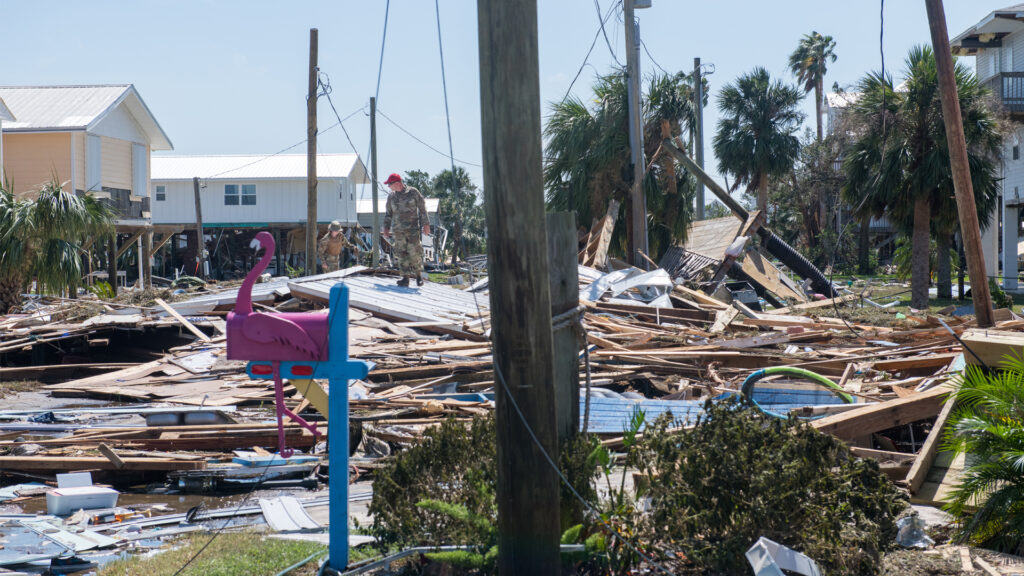By Dawn Shirreffs, Environmental Defense Fund
Florida’s sunrises illuminate our stunning coastlines every morning, but they also shine a light on the mounting problems our communities face due to our rapidly changing climate. Record temperatures, increasingly intense storms and rising sea levels are a part of Floridians’ daily lives.
While climate change may have been considered a partisan issue in the past, the consequences of climate change now affect everyone. Recent polling shows that 79.3% of Floridians believe it’s crucial for the state to develop coastal resilience plans to adapt to rising sea levels and mitigate storm surge during hurricanes.

Recent hurricanes, severe storms and flooding have created a massive fiscal burden on the state and its residents. Climate disasters in Florida have racked up over $100 billion in damages in the just past five years, and Hurricane Helene will only cause that number to rise.
Homeowners are being pummeled with skyrocketing insurance rates. In 2023 alone, rates jumped by an average of 35%, while renewal premiums rose upward of $1,896.
Comprehensive adaptation measures in Florida could help us avoid an estimated $619 billion in property value losses from sea level rise by 2100. Without far-reaching action, flood damage costs for Gulf Coast residents could hit up to $176.6 billion over the next decade. Not only does this pose a threat to Floridians’ livelihood, it also strains local government property tax revenues needed to fund schools, parks and law enforcement.
Florida legislators have taken the first steps to mandate statewide sea level rise projections from Florida’s Flood Hub and made state funding available for adaptation projects through the Resilient Florida fund.
The good news is solutions exist. Nature-based infrastructure, such as mangroves, reefs, dunes and artificial structures that harness nature, are a critical part of protecting coastlines and mitigating damage from severe storms. These natural defenses increase long-term resilience while protecting Florida’s natural beauty and offering solutions that save Floridians and local governments money.
Blending nature-based and traditional infrastructure might look like pairing raised walkways with wetland planting, marsh and mangroves with breakwaters, dunes with reinforced cores and more. By leveraging the best of nature-based solutions and traditional engineering, we use all tools in the toolbox to safeguard Florida’s communities against storms and flooding.

Investing in resilience is essential for our environment and our state’s economy. The U.S. Chamber of Commerce estimates that each dollar invested in building resilient communities and infrastructure saves $13 in disaster rebuilding costs and economic impact. For example, the same study estimated that investing around $10.8 billion in resilience and preparedness for a hypothetical Category 4 hurricane striking Miami could prevent the loss of about 184,000 jobs, saving $26 billion in production and $17 billion in income.
Florida’s lawmakers should pursue a statewide assessment of nature-based solutions tailored to our unique ecosystems and regions. This comprehensive assessment would help identify strategies for blending nature-based solutions with traditional engineering that can help Florida governments, businesses and communities not only recover from sudden and disruptive events, but also ensure long-term prosperity despite ongoing environmental hazards.
By harnessing the best available science and investing in innovative approaches, we can protect Florida today and secure a safer, more resilient future generations to come.
Dawn Shirreffs is the Florida director of the Environmental Defense Fund, working to bring nature-based solutions to the toughest climate challenges that Florida faces. This opinion piece was originally published by the Sun-Sentinel, which is a media partner of The Invading Sea.
If you are interested in submitting an opinion piece to The Invading Sea, email Editor Nathan Crabbe at ncrabbe@fau.edu. Sign up for The Invading Sea newsletter by visiting here. To learn more about climate resilience, watch the video below.



